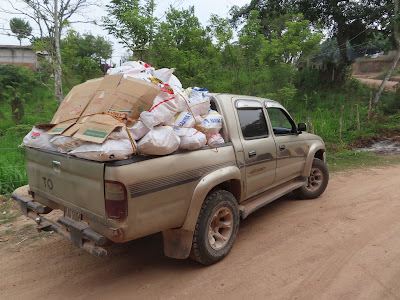An abandoned newborn
Two days ago an infant, less than a day old, was found in a field here in Plan Grande. He was found by a woman who informed the police. The police came (and perhaps the advocate for children and women from a government office in Santa Rosa) and took the child who is now in the Santa Rosa hospital. The medical personnel names him Leonardo David. Yesterday the police were investigating here in Plan Grande and in the nearby health center. They came in an unmarked car.
 |
| Photo from LaPrensa |
I heard about this from a friend but I also heard about it on a Facebook news source. The young man reporting the news was full of indignation. How terrible and inhuman this was, he repeated over and over again. I agree it is horrible. But I also wonder what drove the mother to do this? Or did someone else do this or force her to do this? What would drive a woman to abandon her own child, the fruit of her womb? She might have been a very desperate woman, even a victim of abuse.
I will not justify what was done, but it is important to understand such horrors in light of the whole society. The number of women killed in Honduras is horrifying; domestic abuse of women and children is an epidemic. The poverty, the oppressive society which relies on violence, the macho culture are among the factors that contribute to a society where a newborn can be abandoned. Children and women are not valued – and this horror is just a sign of a problem of the entire society.
A police murder of a black man
Last night there were riots in Minneapolis, protesting the brutal police murder of George Floyd, a 46-year old man of color. The death was brutal and a sign of the racism in the US society, especially in some sectors.
I have become a bit more conscious of this recently when I read a Facebook post of a friend married to a Haitian woman. He is concerned about his young son going out on the street to play or run – and rightly so. People of color are suspect in many places in the US (and the world.)
Some have been quick to condemn the riots. I won’t justify them but I wonder where the desperation comes from. There have been more and more reports of violence, discrimination, and harassment of people of color recently. Note that I wrote “reports.” I don’t think this is a completely new phenomenon, but it appears that the US culture has changed in the past few years. Hatred, discrimination, and even violence against “the other” seem to have become more “acceptable” in a nation where the public discourse, even of people in power, is marked by its harshness and even hatred. I am a bit relieved that I don’t live there; I might be filled with a continual rage.
And so I can understand, without justifying the violence, which is a response to the violence of the murder and harassment of people of color as well as to the use of violence by police and security forces.
I was thus challenged by something Martin Luther King, Jr., said in 1966:
“And I must say tonight that a riot is the language of the unheard. And what is it America has failed to hear? ... It has failed to hear that the promises of freedom and justice have not been met. And it has failed to hear that large segments of white society are more concerned about tranquility and the status quo than about justice and humanity.”
Can I hear the voices of those who are without a voice? Can I look at what is happening from the perspective of those who suffer the effects of a world that values power, violence, machismo, racism, and more?
Can I look at those who suffer with the eyes – and the heart – of a God who became flesh in a place of oppression, occupation, discrimination, violence and more?
Can I see history from the bottom, where, I believe, God walks and suffers?
Can I remember the witness of the martyrs, especially those in Central America?
Yesterday I read, with great joy, that another martyr of Central America has been recognized. On June 14, 1980, in the church of San Juan Nonualco, El Salvador, Franciscan friar Cosme Spessotto, a Italian missionary, was killed – martyred, as the Vatican acknowledged. He may soon be beatified, joining the ranks of Central Americans in Guatemala and El Salvador and missionaries from the US, Italy, and Spain who were martyred for their faith and their loving commitment to the poor.
 |
| Central American Franciscan martyrs, Cosme Spessotto and Blessed Tulio Marruzzo |
There is hope.
As the US poet Maya Angelou, who died six years ago, wrote:
"Love recognizes no barriers. It jumps hurdles, leaps fences, penetrates walls to arrive at its destination full of hope."
Let us be people of love, filled with hope, listening to those who are unheard – forging a new world of justice, love, peace, and solidarity.





























